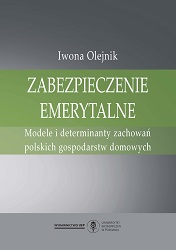Zabezpieczenie emerytalne. Modele i determinanty zachowań polskich gospodarstw domowych
Old-age pension security. Models and determinants of Polish households' behaviour
Author(s): Iwona Olejnik
Subject(s): Politics / Political Sciences, Politics, Social Sciences, Economy, Law, Constitution, Jurisprudence, Sociology, Family and social welfare, Welfare services, Law on Economics
Published by: Wydawnictwo Uniwersytetu Ekonomicznego w Poznaniu
Keywords: zabezpieczenie emerytalne;system emerytalny;oszczędzanie na starość;zachowania gospodarstw domowych;gospodarstwa domowe;pierwotne badania jakościowe;emerytury;
Summary/Abstract: The problem of securing the material needs of individuals who due to their advanced age have a limited opportunity to acquire incomes which would allow them to satisfy these needs is a valid and vital one. Nowadays, almost in all developed countries, the number of people who have finished or will soon finish their professional career due to their advanced age is growing. For this reason, state pensions systems become increasingly financially inefficient. This inefficiency determines the necessity to introduce changes in the structure of the incomes acquired when retired – decreasing the dominance of the benefits received from the state institutions and increasing the share of funds coming from private financing. It is difficult to precisely determine what part of pensions provision should be fulfilled by individual voluntary savings and other methods of providing for old age. It is beyond doubt that too low savings may result in the deterioration of the quality of life when retired (if old age pensions received from the state system also prove insufficient). It is anticipated that a considerable percentage of the employed population does not or will not be in possession of sufficient savings – acquired both from the public system and set aside individually – to provide for retirement. Moreover, economic and social changes, particularly those occurring in the labour market, the improvement of the quality of life, economic emigration, but also the changes occurring in the models of family and legal regulations in the pension systems contribute to the changes in the attitudes and behaviour of households as regards to their choices. The above mentioned monograph focuses on the behaviour of households with regard to providing for their members' future retirement. The main subject is the behaviour of households in the period of accumulation of pension capital, i.e. in the first stage of the so-called risk of ageing. This stage finishes with reaching the retirement age, which is connected with losing one's incomes achieved so far from performed work. Minimizing this loss requires transferring a part of one's consumption from the period of being professionally active (by means of accumulating savings) to the period of old age in the future. The extensive knowledge about the behaviour of various groups may enable better social policy actions and creating pension products tailored to the needs of households. Therefore, the main aim of the paper was to build a model of attitudes and behaviour of households regarding financial security when retired. Taking into consideration the multifaceted nature of the research issues, an attempt was made at creating a whole model of the attitudes of households towards providing for old age. The construction of the model of the attitudes of households towards providing for old age was possible thanks to using the exploratory and confirmatory factor analysis. This model consists of 4 constructs: the belief that additional pension provision is necessary, knowledge, securing one's family and expectation towards life when retired.
- Print-ISBN-13: 978-83-7417-902-7
- Page Count: 226
- Publication Year: 2016
- Language: Polish
- Table of Content
- Introduction
- eBook-PDF

